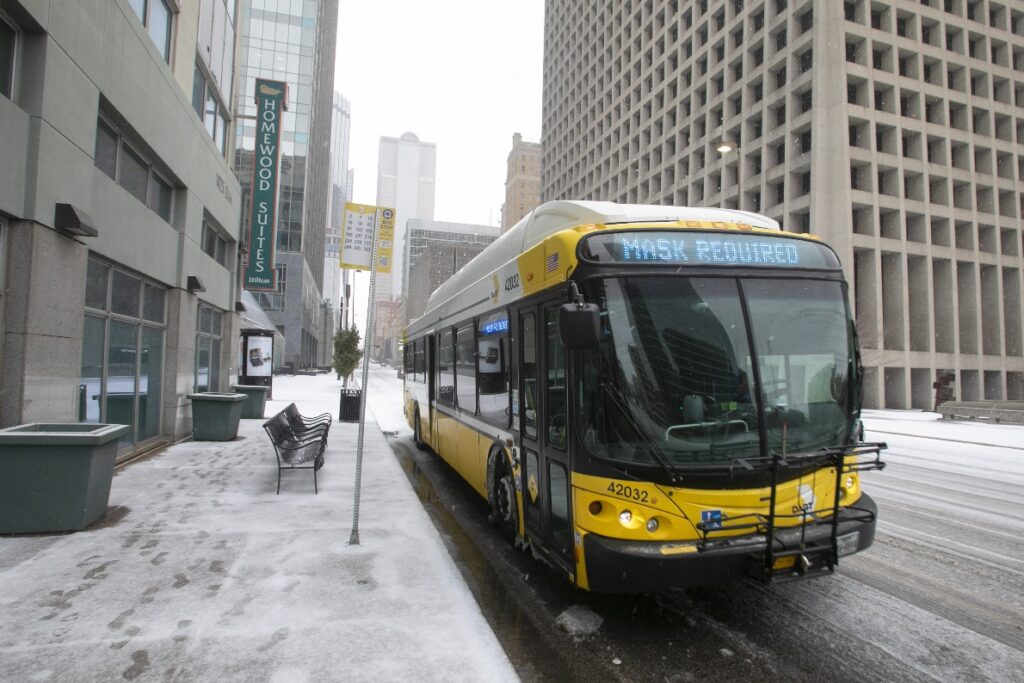When locals buy lots of stuff, agencies like Dallas Area Rapid Transit benefit. DART’s balance sheet has an extra $215 million beyond what was forecast because of higher-than-projected sales tax revenue from between 2019 and 2021.
DART staff is now asking the board for permission to give it away to its partner cities, so long as they spend it on transit-related projects. The agency would also deploy a second fund of $55 million to help these cities make public transportation more accessible, bringing the total giveaway to about $270 million.
But what would that look like?
DART is funded by a 1-cent local sales tax agreement among the 13 municipalities for which it provides public transportation. Funding from the Coronavirus Aid, Relief, and Economic Security Act bolstered the transit agency’s budget so much that it collected about $215 million over what it expected in sales tax.
DART received about $229 million in federal coronavirus cash in 2020. It earned another $61 million from the Infrastructure Investment and Jobs Act earlier this year, which helped offset the cost of things such as rehabbing buses and rail cars. As consumer spending rebounded and sales tax receipts sailed past what was expected, DART is now sitting on a fund and figuring out how to spend it.
Staff was directed to design a giveaway program after a discussion during a Board of Directors’ workshop in June. The allotment would be included in the agency’s upcoming budget for the next fiscal year, and DART would have to enter into interlocal agreements with its partners. With the board’s approval, the money could be distributed in as little as six months. Staff’s presentation divides the money by the proportion of sales tax each city is accountable for, which means Dallas would get about half of it.
But DART has plenty of its own needs.

Before the board was briefed on the giveaway last month, DART CEO Nadine Lee provided an update on the agency’s long-term financial prospects. DART plans to invest at least $1.9 billion in capital projects over the next five years. About 95 light rail trains will reach the end of their 30-year lifespan between 2025 and 2028. The agency will have to upgrade portions of its signal system before those replacement trains can run. That will cost $1 billion, Lee said, up from previous estimates of $500 million.
The agency plans to bolster passenger amenities across the system, raise 23 platforms, update and maintain buildings such as its administrative headquarters, and invest in its technology and communication systems. It would love to weatherize its light-rail system, make improvements to bus corridors, and establish a bus rapid transit program—but those expenses aren’t yet programmed into the budget.
The budget for these items—which is housed in what’s known as a Transit Asset Management Plan, or TAM—is already underfunded by $937 million. Lee anticipates those costs to increase the longer the agency waits.
“If we can’t come up with the money to make up for that shortfall, we’re going to have to take longer to do things that we planned to do in the next five years,” Lee told the board. “This is not unique to DART. If you have to push things out farther … you deal with more repair work over the next few years. It’s just a matter of priorities.”
Either way, this is a remarkable opportunity, especially considering how different the agency’s reality is compared to forecasts from May 2020. Back then, just a few months into the pandemic, DART had anticipated its sales tax revenue to drop by 50 percent in both 2020 and 2021. The federal stimulus money kept the agency humming as ridership plummeted, and the member cities all brought in more in sales tax than the understandably conservative estimates had anticipated.
The possible giveaway is also a political move that would generate goodwill with DART’s partners. The agency can’t do a lot of things that make transit more effective. It has no control over infrastructure, which is managed by member cities. It doesn’t maintain or improve traffic signals. Dallas is already proposing using its batch of money for 11 projects, which include helping fund DART’s free rides for students, offsetting the streetcar’s operating and maintenance cost, and chipping away at the needs established by the city’s Sidewalk Master Plan.
It’s no wonder some on the board offered full-throated support for handing out the money to cities.
“All the cities question the value proposition DART provides them,” said DART Board Member Paul Wageman, who was appointed by the Plano City Council. “This is a way to demonstrate in a significant way, one time only, a significant amount of returning of funds because sales tax receipts have been well beyond budgeted and will continue to be well beyond budgeted.”
About that value proposition: DART has had to shut down its light rail for short periods most winters since 2009 because the lines aren’t weatherized. During the most recent freeze, DART suspended bus operations for the first time in its 39-year history. The streets were frozen for a time, but the agency also didn’t have enough drivers who could show up to work. A driver shortage has also led to delays after the agency rolled out its new bus network.
Hosanna Yemiru, a DART board member appointed by the city of Dallas, thinks DART can better use that money itself instead of giving it away. “What I think of as the responsibility of DART and the value DART brings to member cities is running an efficient and effective public transportation system,” Yemiru said. “If we’re able to use this money for things we know internally we have to fix, and we know these things are going to also affect our ridership, that will make our riders feel like we’re investing into them as users of our system.”
There’s also the matter of how the money might be divvied up. Another Dallas-appointed board member, Patrick Kennedy, argued that the allotment should be decided by population rather than sales tax percentage. Some cities, such as Garland, have higher ridership than their sales tax revenue would reflect. He argues that smaller cities, such as Glenn Heights, should receive a flat fee, or else they’d get what amounts to pennies.
Kennedy also wants the program run like a grant proposal. Maybe the cities pitch projects that DART approves. Maybe those cities pitch in some of their own dollars, too, to make an even bigger impact. He doesn’t want to hand over a blank check.
“Their land use policies, parking policy, density, job density, and last-mile connections—whether the public realm feels safe, whether it’s walkable—those are all things that are outside of our control at the agency,” he said. “And a lot of our member cities are cash-strapped.”
Dallas alone is missing more than 2,000 miles of sidewalk. It’ll cost $54 million just to bring its curb ramps up to the standards of the Americans with Disabilities Act. Those were included in the 11 ideas that it would spend this money on, according to a memo sent to Council by Assistant City Manager Robert Perez.
The full DART board is expected to vote on the matter this month. This is, after all, a good problem to have. Two years ago, the previous DART CEO was staring down a pandemic and telling the board, “We don’t have any history to know how it’s going to behave.” Extra dollars weren’t in the cards. They are now.
That’s certainly something to be grateful for. But now we’re flirting with a recession, which would be marked by a drop in consumer spending—which then means a drop in sales tax revenue and how much money the agency brings in.
DART has a rare predicament on its hands: how will it decide to use this money?
Get the D Brief Newsletter
Author




